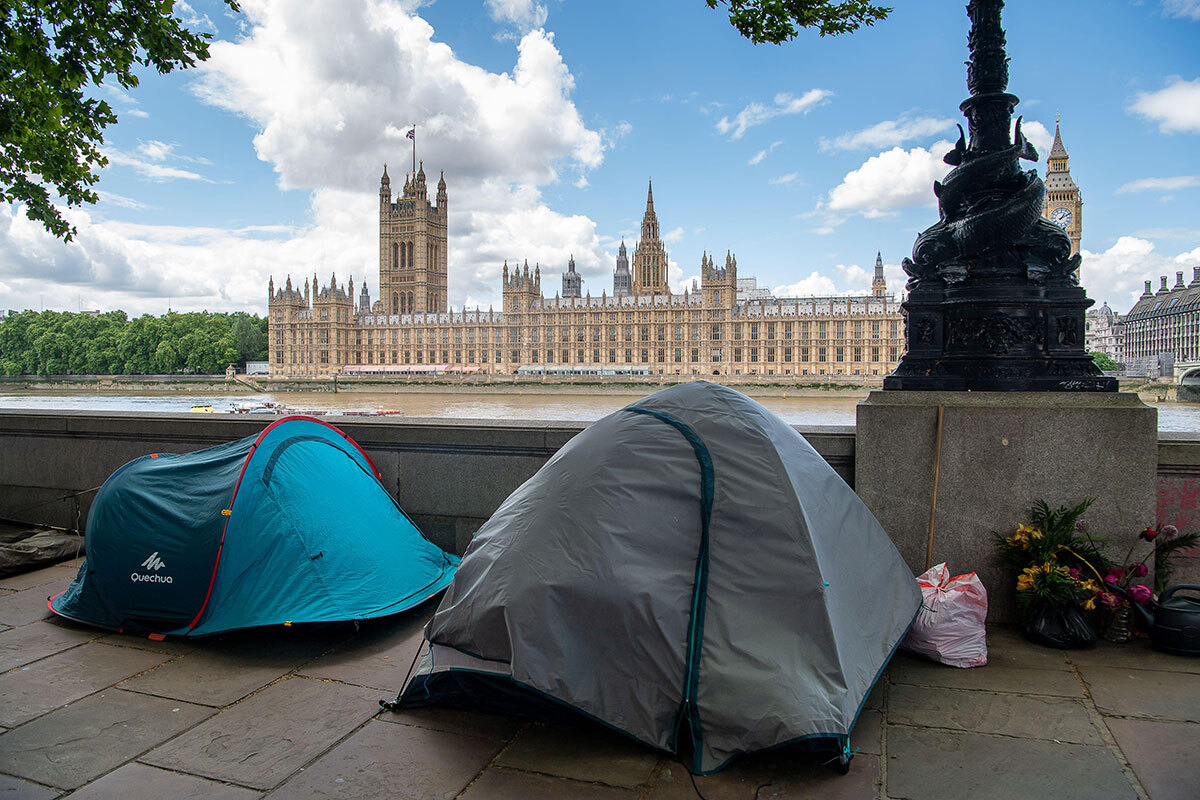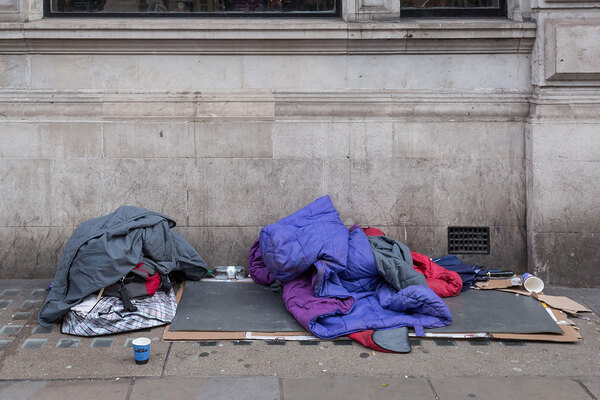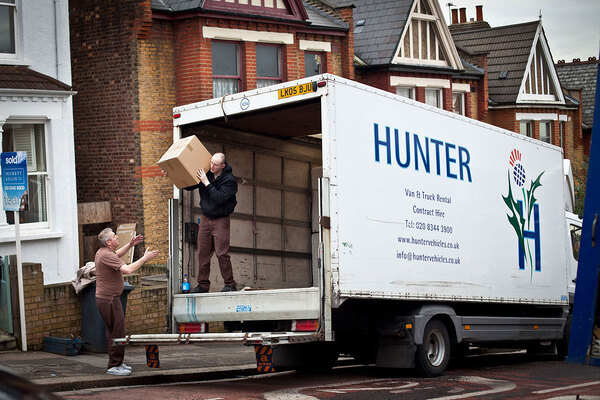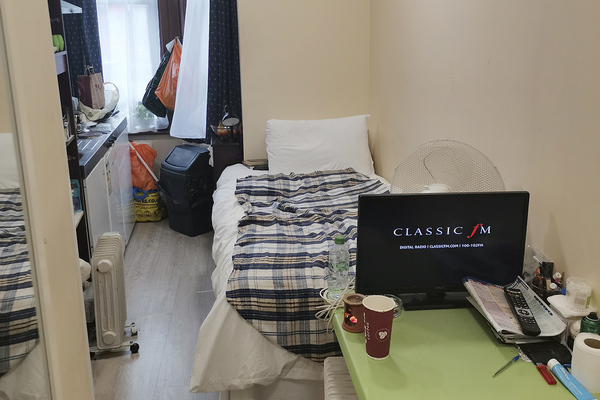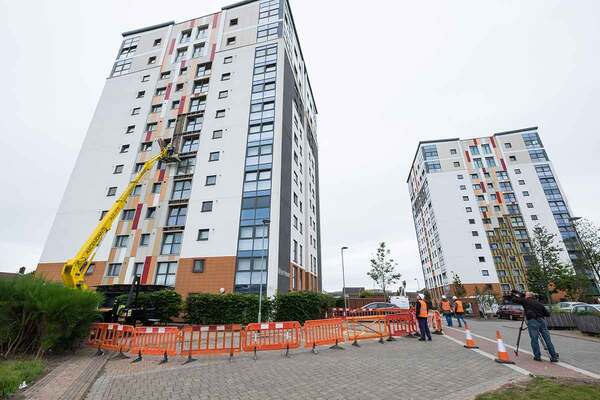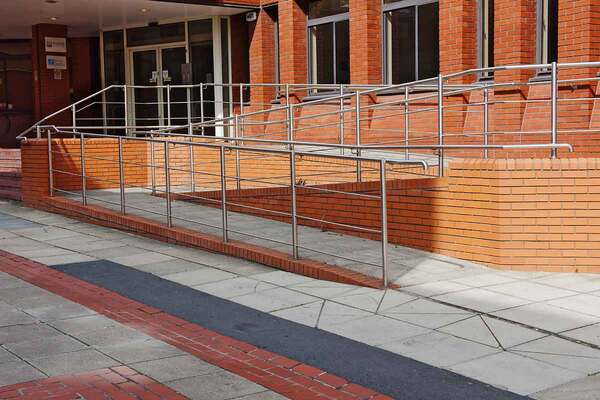You are viewing 1 of your 1 free articles
Can backbench MPs and campaigners stop the government’s ‘offensive’ plans to criminalise rough sleeping?
A battle is underway to stop “offensive” plans to criminalise rough sleeping. James Riding asks how we got here and what hope there is of amending the most punitive measures
“The wording at the moment is offensive. That’s the only way to describe it.” Backbench Conservative MP Bob Blackman is furious about rough sleeping measures in the government’s Criminal Justice Bill.
This mammoth piece of legislation, which is currently passing through the House of Commons, contains powers to crack down on what the government calls “nuisance rough sleeping”. If it is passed, police and councils will be able to move on rough sleepers, issue them with fines of up to £2,500 or imprison them for up to a month.
‘Nuisance rough sleeping’ is defined as someone who is sleeping rough or “intending to sleep rough”, and who “causes or does something capable of causing damage, disruption, harassment or distress”. Damage includes “excessive noise, smells, litter or deposits of waste”.
“One of the issues is, for example, if they smell excessively,” Mr Blackman tells Inside Housing. “Anyone who knows anything about rough sleeping knows that the people that are sleeping rough don’t have access to bathrooms, showers or baths. It’s tough enough for them to be able to clean up, let alone deal with how they smell.”
After the government promised in 2019 to end rough sleeping, it then pledged to repeal a century-old begging law. Do the government’s plans have any chance of working as intended? And will backbench MPs and campaigners be able to stop them?
Inside Housing dives into the current state of the Criminal Justice Bill.
1824 inception
The story begins in 1824. Amid an uprising of radicalism and unrest following the Napoleonic Wars, the government passed the Vagrancy Act. It is a law “for the punishment of idle and disorderly persons” such as prostitutes, pedlars and beggars, who can be fined up to £1,000. It is still on the statute books, although police use is increasingly sparse.
Homelessness charities, such as Crisis, have long campaigned for this act to be repealed. In February 2022, it looked as if they had got their wish when the House of Lords voted to abolish the law through an amendment to an earlier crime and sentencing bill.
Through negotiations, the government committed to repealing the Vagrancy Act, but said it wanted to put something else in place to deal with aggressive begging and anti-social behaviour. Most charities continue to argue a replacement law is unnecessary and that police have enough tools at their disposal to deal with anti-social behaviour already.
The Criminal Justice Bill was introduced in December 2023 with the long-promised measures around ‘nuisance begging’ – but it also contained an unexpected new section on nuisance rough sleeping, which had not appeared in the prior consultation.
At some point, the government’s rhetoric had sharpened significantly, perhaps under the influence of former home secretary Suella Braverman, who oversaw the creation of the bill until she was dismissed in November 2023. That month, she had notoriously warned of “rows of tents” on Britain’s streets occupied by people “living on the streets as a lifestyle choice”.
‘Cruel and counterproductive’
MPs and homelessness charities were blindsided by the bill. “The government is saying this replaces the Vagrancy Act, but it makes the Vagrancy Act seem tame by comparison,” explains Mr Blackman.
Francesca Albanese, executive director of policy and social change at Crisis, calls the proposals “cruel and counterproductive”. She believes they will “create additional barriers for people trying to move on from homelessness”.
Punishing people “for being failed by the system” will “break down trust” with authorities and discourage them from seeking help. Furthermore, the fear of being moved on or fined could lead people to hide themselves away in more dangerous areas.
The government has indicated that it may tinker with definitions of “smell”, but “that would do nothing to address the wider problems with either the bill or the housing crisis”, Ms Albanese adds.
Currently, the bill is “very vague in its descriptions of what anti-social behaviour would be”, says Sophie Boobis, head of policy and research at Homeless Link. The inclusion of people who look like they are “likely” to sleep rough raises concerns around discrimination and stereotypes.
According to Crisis, nine in 10 people who have slept rough have faced some form of violence or abuse – a figure that could increase further if the new measures are brought in.
But there is an even more fundamental question: will the powers actually work?
Charlotte Cook, partner at law firm Winckworth Sherwood, is unconvinced. “This doesn’t really add anything,” she says. “If there are concerns about anti-social behaviour or similar, they can and should be being dealt with, if that is the right track to take, under existing legislation.”
“I anticipate the government will argue the criminalisation is intended as a deterrent. I can’t see that working. I think if you’re begging on the streets, this is not going to stop you doing that,” she adds.
“The money would be better spent on support services to help people get off the streets in the first place.”
As for the fines, “in the worse-case scenario, it means that you’re just setting people on the course to imprisonment,” says Ms Boobis. “If you don’t pay your fine, you end up in court and then you can get sentenced to prison for not paying.”
After all, how many rough sleepers will have £2,500 spare?
Focus on assistance and prevention
The backlash to the bill reached fever pitch before Easter, with backbench MPs, charities and housing bodies coalescing around a series of amendments that would repeal the Vagrancy Act and the nuisance rough sleeping provisions, as well as providing guidance to police and councils about how they can use existing powers to deal with anti-social behaviour.
“What my amendments do is basically change the whole emphasis on to assistance rather than causing people to be potentially arrested,” explains Mr Blackman. “So the police will assist people that were forced to sleep rough rather than criminalise them.”
“We think the best course of action is to entirely remove this part of the bill,” says Ms Boobis. “But if the wording is going to stay, then we do absolutely need strong guidance for local authorities and police forces.”
That guidance will say services need to ensure that rough sleepers access appropriate support. However, she points out that “appropriate support doesn’t exist at the moment for everybody”. This is because of a lack of funding for support services.
Suzannah Young, policy leader (residents and services) at the National Housing Federation, says: “Homelessness services are at risk of closure due to a number of financial challenges and the ongoing risk of decommissioning of services by cash strapped local authorities.
“Instead of taking punitive action against individuals, we need a long-term plan for housing that includes ringfenced funding for these vital services.”
Polly Neate, chief executive of Shelter, says: “Homelessness happens when government housing policy fails. It is the government’s catastrophic failure to build enough social homes combined with spiralling private rents that has led to record numbers of people not being able to afford to live anywhere.
“Parliament must not enact this legislation. Instead of punishing people for being homeless, politicians should be trying to prevent them from ending up on the streets.”
So, what next for the bill?
Talks with the government are ongoing, but MPs are hopeful. “There’s so much in this bill that is still being negotiated,” says Mr Blackman. “The rough sleeping and homelessness bit is one element, but the government are worried about the amendments that are potentially coming on abortion.
“There are amendments from Iain Duncan Smith on cuckooing… That’s all being discussed at the moment between ministers, officials and those representing particular causes.”
The Home Office has been contacted for a response to the latest developments. It previously told Inside Housing that the measures will tackle rough sleeping and begging “where it causes damage, disruption, harassment or distress to the public” and avoid criminalising the “genuinely vulnerable”.
A Home Office spokesperson said: “The bill concentrates on behaviour that is anti-social, including causing environmental damage such as with excessive noise or litter. No one will be criminalised for simply having nowhere to live.
“We will continue to engage with stakeholders and parliamentary colleagues in the usual way as the bill passes through parliament.”
Sign up for our homelessness bulletin
Already have an account? Click here to manage your newsletters
